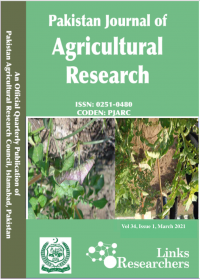Sampling and analysis of ground water of Bahawalpur Tehsil, Pakistan, has been made to evaluate its suitability for irrigation use. Water samples from different areas of the tehsil were collected and analysed for various physic-chemical properties like pH, electrical conductivity (EC), sodium adsorption ratio (SAR), residual sodium carbonate (RSC), calcium (Ca++), magnesium (Mg++), sulfates (SO4-), carbonates (CO3-), bicarbonates (HCO3-), sodium (Na+), and chloride(Cl-). Results showed that 52.78% samples were unfit and 34.37% samples were considered as fit for irrigation. The interesting thing is that about 12.85% sample lies in the category of marginal fit waters for irrigation purposes after comparison with the standard values used for irrigation water for agricultural crops. The values of EC, SAR, and RSC were ranged from 0.031 to 15.39 dS m-1, 0.02 to 52.66, and 0 to 43.3 me L-1, respectively. Overall, in southwest areas the majority of water samples were found to be fit for irrigation while in northwest area majority of the water samples fall under unfit range. The SO4 ranges from 89 to 1435 mg L-1. The highest value of SO4 was observed in the samples collected from Chak 13/BC, Chak 23/BC, Chak 12/BC and Cantt Area. The highest cotton and wheat yield on average basis was recorded in union council Goth Gani as compared to all areas while lowest cotton yield was observed in union council Mari Sheikh Sajra. In the light of above findings it is inevitable to treat the ground water with gypsum stones, dilution with canal water and growing of salt tolerant crops. It is necessary to manage the soil structure on sustainable basis for obtaining optimum crop yield.






